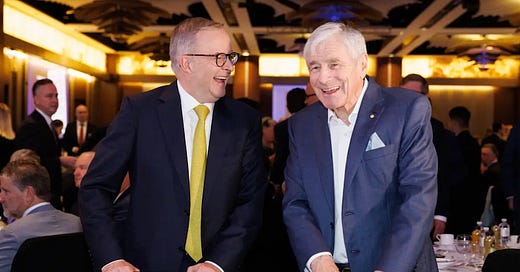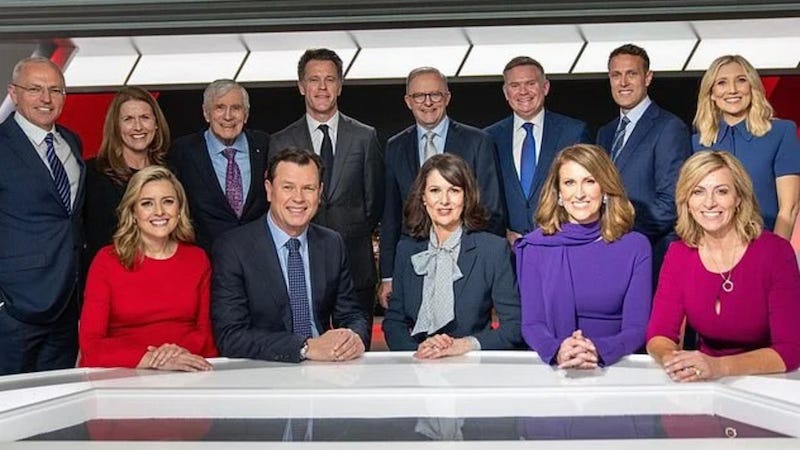The hi-viz corporate appeasement: Politics, corporate influence and public perceptions
It’s more than “just a hi-viz vest”. It’s about vested interests.
In an era marked by growing public skepticism toward political leadership and increasing concerns about the influence of corporate interests on government decisions, a recent choice by Prime Minister Anthony Albanese has reignited the discourse surrounding the intertwining of politics and business.
The focal point: it might seem like a trivial matter, but it was the Albanese’s choice of attire during a visit to Karratha, where he made a announcement regarding Australia’s dependence on the mining sector, particularly emphasising the critical minerals sector encompassing resources like lithium and nickel. While the essence of the announcement may have been a matter of national importance, it was the emblem on his clothing that set off a cascade of criticisms and raised fundamental questions about the nexus of power and corporate influence in contemporary politics.
The symbolism behind the Prime Minister’s attire is both apparent and disconcerting. Albanese’s decision to don a high-visibility vest emblazoned with the Rio Tinto logo sent a stark message—one that suggested a troubling proximity between the highest office of government and corporate interests. It is a message that resonates far beyond the initial visual impact; it underscores the blurred lines between political authority and private sector persuasion. This act encapsulates a broader issue in modern politics, where the perceptions of events often hold as much sway as the actual intentions behind them.
This instance is not an isolated one: it is part of a larger pattern of politicians, including the previous Prime Minister Scott Morrison, engaging in symbolic dress-ups and donning attire prominently featuring the logos of mining companies. These gestures, while dismissed as harmless or trivial by supporters, cannot be ignored or brushed aside. They collectively reflect an ongoing trend where corporate interests appear to be encroaching further into the domain of governmental authority.
It is crucial to recognise the importance of maintaining a clear demarcation between corporate interests and government decisions. A robust separation between the two is essential to ensure that policies and regulations are crafted in the best interest of the citizens and the nation, not by the agendas of powerful entities.
The presence of the Rio Tinto logo on the Prime Minister’s vest also goes beyond mere optics; it raises concerns about ethical considerations. Rio Tinto, a multinational mining corporation, has been embroiled in controversies, most notably for its destruction of Aboriginal rock art dating back thousands of years in the Juukan Gorge in 2020—a grievous act that speaks to a disregard for cultural heritage and human rights. By wearing attire associated with such a company, the Prime Minister inadvertently or otherwise sends a message that may be perceived as an endorsement of this behaviour. It is a stark reminder that in politics, perception often shapes public opinion more than the actual intentions of those in power.
In addition to these concerns, the broader issue of multinational mining companies exploiting Australia’s mineral resources with relatively minimal contributions to the national treasury warrants attention. The Australian government, as outlined in the Constitution, holds ownership of these resources on behalf of the public, yet foreign companies have historically reaped substantial profits with comparatively little financial obligation to the nation. This situation raises questions about equity and fiscal responsibility, issues that should be of paramount importance to any government.
The symbolism of Albanese’s visit to Western Australia
The intricacies of political symbolism and its impact on public perception was also profoundly evident in the context of Albanese’s visit to Western Australia. This journey, ostensibly for a special cabinet meeting in Perth–Boorloo, was strategically positioned as a means to solidify the Labor Party’s stronghold in the state. Western Australia, a resource-rich region with a powerful mining industry, is a vital battleground for political influence. In state politics, the Labor government maintains a commanding presence, holding 53 of the 59 seats, while at the federal level, it secured nine out of the 15 seats, aided by a significant 10.5 per cent swing towards the party during the 2022 federal election.
The significance of this trip cannot be overstated. It underscores the symbiotic relationship between politics and industry, especially in a state so heavily reliant on the mining sector. But the trip also adds to the perception that politicians, in this case, the Prime Minister, are beholden to corporate interests, potentially influencing their decision-making in favour of these companies.
The public perception of politicians as being in the pocket of powerful corporations has long been a contentious issue in politics. Such perceptions have often fueled cynicism and mistrust among voters, undermining the integrity of the democratic process. It is a perception that all political parties, not just Labor, should strive to dispel. In an era where political trust is increasingly fragile, politicians should be cautious about giving the impression of subservience to corporate entities.
Moreover, it is essential to recognise the significant financial contributions made by corporations such as Rio Tinto to political processes in Australia. While these donations might not flow directly to political parties, they find their way to influential third-party entities like the Minerals Council of Australia and the Business Council of Australia.
In recent years, Rio Tinto alone has contributed approximately $4.6 million, while other mining giants like BHP and Glencore have also made substantial donations, resulting in a staggering $137 million influx of funds from the mining industry over the past two decades. These contributions raise legitimate concerns about the undue influence of big business on political decisions, a problem that has plagued democratic systems around the world.
Beyond optics: Leadership and accountability
The Prime Minister’s visit to Karratha aligning his office with the Rio Tinto logo extends beyond the immediate optics and touches on critical aspects of political leadership, campaign financing, and the role of the media in holding leaders accountable.
While we can’t expect the Prime Minister of the day to denounce a corporation’s environmental or human rights record while they are making a public announced on their site – there is a time and a place for this – the public does expects its leaders to act in the best interests of the nation, which includes protecting the environment and respecting human rights.
There is also controversy surrounding the delayed release of the climate crisis report by the federal government and this delay also underscores the importance of transparency and accountability in governance. The public deserves access to information that can impact their wellbeing and the environment, especially when there is a link between environmental damage and mining companies such as Rio Tinto. Delaying the release of such a report raises suspicions about political motivations and the prioritisation of short-term interests over the long-term health of the planet.
A solution to that problem of government links with business and financial donations would be a ban on donations and fully publicly-funded elections, which would reduce the undue influence of big business on the political process. Publicly-funded elections can help level the playing field, ensure transparency, and minimise the perception that politicians are beholden to their financial backers. While there may be concerns about the impact on associated think tanks and interest groups, the priority should be to safeguard the integrity of the democratic process.
Moreover, a vigilant media should be doing far more in holding leaders accountable. Media outlets should not shy away from questioning and critiquing the actions of political leaders, regardless of their party affiliation, as the media plays a crucial role in providing information, fostering public debate, and ensuring that leaders are answerable to the electorate. However, this is unlikely when the dominant owners of Australia media – Kerry Stokes and Rupert Murdoch – also hold substantial mining and resources, and an neutered ABC which seems to have forgotten that there was a change in government in 2022, and is still pandering to the political interests of the Liberal Party.
It is essential to recognise that constructive criticism of political leaders does not imply that everything a government does is inherently bad and acknowledging positive actions and praising good governance is equally important. The Albanese government has achieved much during its 15 months in government, and is a marked improvement on the behaviours and performances of the Morrison government. However, during periods when concerns about governance are pronounced, criticism can serve as a valuable check on power and a catalyst for improvement: this is the case for the Albanese government, as it is for all governments: no administration is going to be perfect, but the goal is to make governments less imperfect and seek improvements wherever possible.
Media reform unlikely to occur with associations with tycoons and proprietors
While much focus was placed on Albanese’s visit to Karratha, there are other events and circumstances causing concern, particularly the launch of Severn West Media’s new studios in the inner-Sydney suburb of Eveleigh, and his association with corporate figures, underscore the complex interplay between politics, media, and corporate interests in Australia. These instances raise crucial questions about the feasibility of achieving media reform, the ethical implications of political associations, and the alignment of political leaders with their ideological roots.
The convergence of political leaders such as Albanese and NSW Premier Chris Minns, and business magnates like Kerry Stokes at media events can be seen as emblematic of the close-knit relationships that often exist within influential circles. Such interactions can cast a shadow over the prospects of media reform, as the intertwining of political and media interests can create an environment where change becomes increasingly difficult. The perception of collusion between politicians and media tycoons further erodes public trust in the ability of the government to act independently and in the public interest.
The government’s recent support for Qantas and the decisions protecting domestic airline routes raise concerns about the criteria and motivations behind government decisions. The lack of transparency in the denial of extra flights for Qatar Airways, juxtaposed with the apparent benefits provided to Qantas, fuels suspicions of favouritism and corporate influence in government decision-making. The perception of special privileges granted to Qantas, particularly in light of the provision of a Chairman’s Lounge VIP pass to the Prime Minister’s son, underscores the importance of maintaining public trust and dispelling any perceptions of impropriety.
The alignment of Albanese with corporate interests and his apparent departure from the principles of the Socialist Left faction within the Labor Party – the faction that Albanese originated from and used to move up the ranks of the party – also is concerning. While the complexities of governance often necessitate compromise and negotiation, leaders should strive to uphold the values and policies they have passionately advocated for throughout their political careers. The disappointment expressed by some segments of the electorate reflects the challenge of maintaining ideological consistency in the face of political realities.
The dynamics surrounding Albanese’s engagements with corporate interests highlight the intricate web of political, media, and corporate relationships in contemporary Australia. While supporters have argued that “it’s just a hi-viz shirt” and suggested that there is enough criticism from conservative media interests such as News Corporation and why should smaller independent and progressive media outlets add to the noise, it’s more than “just a hi-viz shirt”. It’s far more that that.
These events call into question the feasibility of long-overdue media reforms and actions that are in the public interest, the perception of political associations, and the alignment of leaders with their ideological foundations. While the challenges of governance are undeniable, leaders must navigate them with a commitment to transparency, accountability, and the values they have long championed. Only by doing so can they hope to earn and maintain the trust of the electorate and uphold the principles that underpin their political ideologies.









